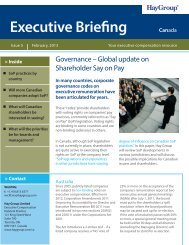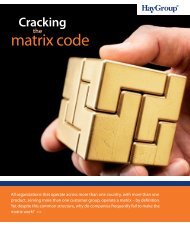Amygdala Hijack - Hay Group
Amygdala Hijack - Hay Group
Amygdala Hijack - Hay Group
Create successful ePaper yourself
Turn your PDF publications into a flip-book with our unique Google optimized e-Paper software.
So what happened next?<br />
Fortunately, there’s a lot more to a brain than the<br />
amygdala, otherwise we’d all be quivering wrecks of<br />
emotion. In this case, the colleague of the frozen<br />
police officer realized that what he was seeing in<br />
the knifeman was fear.<br />
The police officer reports saying quietly, without thinking about it:<br />
‘Are you OK, sir?’ It’s almost funny, really – a silly question. But suddenly<br />
the anger drained out of the knifeman and he started crying.<br />
No weapons. No shouts of:<br />
“<br />
Just the question:<br />
put the<br />
“<br />
are you<br />
”<br />
It’s good policing and an example of how the brain’s prefrontal lobes<br />
act as a manager for the emotions and help us decide how to use the<br />
range of emotional tricks up our sleeves. When to praise, when to<br />
persuade, when to laugh uproariously at your client’s unfunny joke or,<br />
for this police officer, when to show sympathy.<br />
knife down now<br />
OK, sir?<br />
”<br />
These emotional skills and our ability to use them are what we call<br />
Emotional Intelligence (EI).<br />
What is Emotional Intelligence?<br />
In the words of EI guru Dr Daniel Goleman (more<br />
about him later), Emotional Intelligence is: ‘the<br />
capacity for recognizing our own feelings and those<br />
of others, for motivating ourselves, for managing<br />
emotions well in ourselves and in our relationships.’<br />
In this case, the police officer acknowledged his own feelings<br />
and inexperience, but wasn’t overwhelmed by them. Indeed,<br />
he took the lead when he realized that his colleague had ‘frozen’.<br />
He was demonstrating some of the elements that are so important<br />
in Emotional Intelligence: emotional self-awareness, empathy,<br />
and influence.<br />
Self-Awareness<br />
Knowing your emotions and their effects.<br />
Self-Management<br />
Knowing how to manage your emotions, how to keep<br />
disruptive impulses in check. Being flexible and comfortable<br />
with new ideas.<br />
Social Awareness<br />
An ability to listen, to be persuasive, to collaborate,<br />
to nurture relationships.<br />
Relationship Management<br />
An ability to influence others, handle conflict, develop,<br />
lead and work with others.<br />
2 3

















